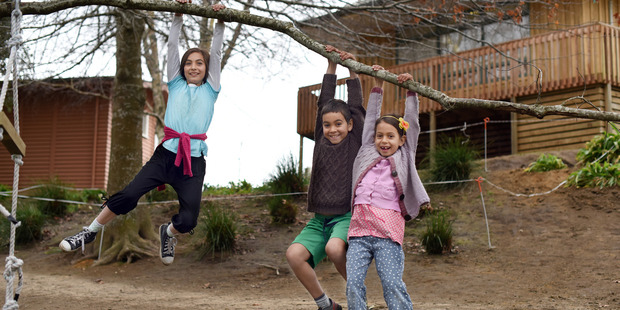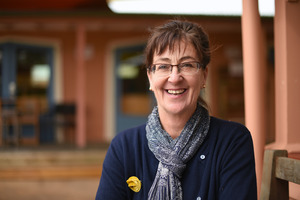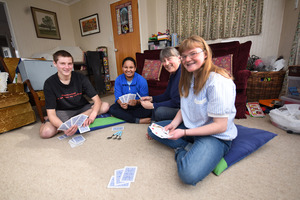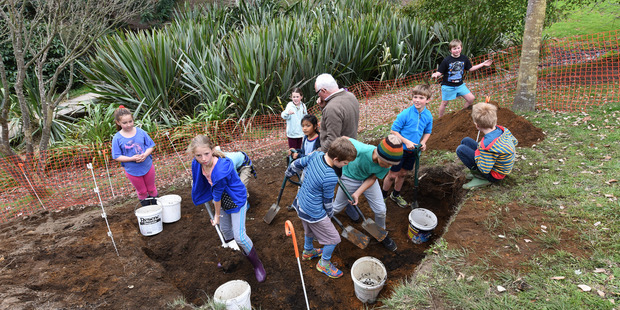Learning unplugged: School ditches digital
By Dawn Picken
8:42 AM Monday Sep 14, 2015

As Kiwis spend more time and money on technology like smart phones and computers, some of us are pulling the plug - opting for a low-tech life. While statistics show more than 80 per cent of New Zealanders have an internet connection, some locals, including education leaders, have put their digital lives on a diet.
Bay of Plenty Times Weekend reporter Dawn Picken reached out the old-fashioned way - by phone and face-to-face - to learn about benefits and challenges of spending fewer hours in cyberspace in favour of more time in the real world.
At Tauranga's Waldorf school, you can see a large swath of farm land (6.5ha), a block of classrooms for preschool through to Year 8 students, animals, a veggie garden and even a room for pursuits like juggling and acrobatics. What you won't see are screens and devices: no computers, projectors, tablets, TVs ... nary a whiteboard inside the class.
Instead, students draw on blackboards and paper. Learning continues outdoors, where Year 4 students shovel buckets of dirt from a hillside.
"We're digging a cave," says one girl. Teacher Michael Rall explains: "This is part of our maths project. They learn about measurements, weights ... it blends in with our main lesson about building. It's sort of a Hobbit glen."
The guiding philosophy of this state-integrated full primary school in rural Welcome Bay is that childhood is a precious one-time event, best undertaken slowly, explored thoroughly, with wonder, espousing the vision of philosopher Rudolf Steiner.
Principal Mary Tait-Jamieson says, while digital technologies are important for research, communication and entertainment, "our view is that computers and other communication technologies work best in the hands of competent teenagers and adults.
"We think a healthy childhood is full of movement, full of doing and full of dreaming. Screen time doesn't provide those things."
The school's online curriculum outline states: "Direct face-to-face communication is seen as vital for the development of language, social competence, and empathy. "Children in the lower school are not taught through computers or through other audio-visual means.
An exception to this might be the introduction of the computer in Class 7 as one of the tools of project research."

Waldorf parents tell Bay of Plenty Times Weekend their kids benefit from being unplugged. Jason Simmonds, an engineering projects manager from Ohauiti, says he moved his three children - 10-year-old Grace, 8-year-old Eli and 7-year-old Ava - from mainstream public school two years ago, where computers featured and the class had a blog.
Now, he says, school and home are mostly tech-free.
"Before Steiner, they would watch a good couple hours on the weekend, and also a little before breakfast during the week. When they started Steiner, they had no weekday TV and now watch at most an hour on the weekends." Simmonds says though his children initially grumbled, the lack of screen time is not an issue.
"They read, draw and play. Eli's doing a lot of reading. You can't get him out of a book these days." He says his kids aren't "glazed over" or grumpy from watching TV. "There's no chance of them interacting with you when they're stuck in front of the screen. They might be in the same building, but they're not engaged with you."
Karen Friskney's 10-year-old son Andrew is a Steiner student. Her eldest son, Thomas, attends Tauranga Intermediate, where he won a general excellence award. The Mangatapu mum says a strict digital diet hasn't hindered her sons' education. "They go to the library and use newspapers as well. It's not like we're cut off. Most devices are user-friendly.
They're not asked to do a programme, they're just asked to use them." Friskney says her boys read lots of books, play sport and play together outside. "You won't hear the words, 'I'm bored,' because they haven't been entertained. There's never been a device to entertain them - they have to sort themselves out."
Rotorua's Pathways Kindergarten head teacher Sue McGeorge (pictured on cover) says she minimised screen time long before working at the Steiner school.
"My children used to think I was terrible. They weren't allowed to use computers at home. They never picked up a computer until they left school at age 17."
McGeorge says lack of digital devices hasn't hurt her adult kids. Her daughter works as a physiotherapist, and her son's an insurance broker and football player who competed for the All Whites and went to the Olympics.
We think a healthy childhood is full of movement, full of doing and full of dreaming. Screen time doesn't provide those things
Mount Maunganui's Glenys Watson home schools her 17-year-old and two 15-year-old children. The solo mum says one computer in the lounge serves the entire household. Her kids get 15 minutes of technology each day, either on the computer, or a Gameboy.
The family doesn't use Facebook and didn't own a television for eight years. Although they have a set now, Watson says it only gets switched on during weekend evenings, unless they're watching news. She says one child reads 90 books a year. "It's wonderful.
We have great family discussions. They're busy and interested in lots of things and not caught up in the negativity of cellphones. I don't have to say 'Stop, look at me'. It means we have more family privacy."
Watson says she wants her kids to be family-centred.
"It's not easy to do, but I believe it's working and wouldn't swap it. I had to make the conscious decision to go against the everyday culture of their peers. It takes hard work and constant vigilance."

She says those choices may not be popular with everyone; in fact, her eldest son who has left home is into technology. She says her teens at home stick to the rules. "We're not always fighting other distractions. Even though my kids aren't online, one became a victim of cyber-bullying, which made me relieved they're not in that universe."
An organisation called the Screen Free Project started in 2013 to drive awareness of social and health effects due to excessive screen time. The group aims to help New Zealand families rebalance electronic play with offline play through education, guidance and fun initiatives. The group's website includes resources for parents about how and why to restrict time spent with devices. Articles linked to the site include one from Britain's Daily Mail, reporting primary school children are speaking like toddlers because parents pacify them with iPads instead of talking to them. Another recent article in the New Zealand Herald says experts are warning parents to limit their children's time in front of iPads and other electronic devices, after new research found prolonged use can result in long-term back and neck problems.
University of Waikato associate professor of screen and media studies Geoff Lealand says, while he spends virtually all day on the computer (with an iPad and iPod close at hand), he doesn't use a cellphone. He says he doesn't want another tech layer and he has seen how phone dependency affects habits and etiquette.
Professor Lealand says we all inhabit technological worlds. "I don't think we can step away from such worlds in any permanent way, for we risk becoming dangerously isolated. But I think it is valuable to take occasional breaks - to sit by the sea and gaze at sand dunes."
He points to a recent study in America, which found 92 per cent of US adults have a cellphone and 31 per cent say they never turn them off. He encourages students to step back from their digital worlds and see the consequences of dependency on "relentless technology".
We're digging a cave, this is part of our maths project. They learn about measurements, weights ... it blends in with our main lesson about building. It's sort of a Hobbit glen."
Papamoa resident June Pharo says she hardly uses her computer, though she took a technology class at the public library. "I've lost most of it. Probably because I keep going back to the old-fashioned way. I do Google things, but that's probably about it."
She never Skypes and she would rather ring than email. "I prefer to actually talk to people. I think the actual talking to people is being lost a bit." She often leaves her cellphone at home. "Only once I can think of where somebody really wanted me and couldn't get me."
Her husband Phil doesn't mind being the go-to guy for tech. "Everything on the computer, I help her with: passport application, internet banking, emails ... we don't spend a lot of time on the computer. It's just a tool we use."
June exercises, volunteers in an op shop and works on Sudoku instead of playing with her phone. She's free of the pre-occupation she sees plaguing many peers. "They'll talk to you and still be punching on their phone, and you know they're not really listening."
Back at the Waldorf School, Mia Kelly and Hamish Graham draw a map of New Zealand.
"The kids get really good at drawing," says principal Mary Tait-Jamieson. She says learning without technology doesn't mean loss of education quality. "Research on multi-sensory learning is quite clear. The more senses used, the more effective learning is."
While she says there are no rules about screen time at home, it compromises a Waldorf education. "It gets in the way of academic development, social development and, obviously, physical development, as it is so sedentary."
The principal says the school received a positive review from the Government's Education Review Office. "They noted that Maori are the school's top achieving cohort group and the school's strong performance in meeting National Standards by Year 8 even with the slow start."
Parent Jason Simmonds says he's pleased with his kids' progress. "They're noticeably happier and more engaged in the school. If I asked how their day was previously, I would get nothing. Now, they come home and want to tell me what they did. It's such a dramatic difference."

For more information see Screen Free Project: www.screenfreeproject.co.nzTauranga Waldorf School: www.waldorftga.school.nz
No comments:
Post a Comment